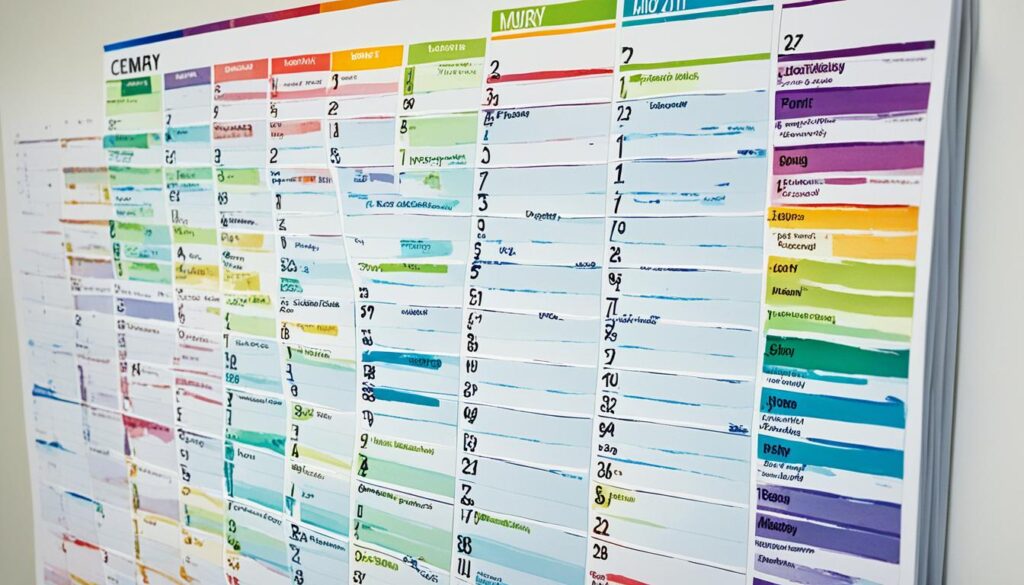
An SEO content calendar is a crucial tool for boosting site visibility and increasing engagement. By strategically planning and scheduling your content, you can ensure that your target audience easily finds your website when searching for relevant keywords and topics.
To create an effective SEO content calendar, follow these key steps:
Importance of Keyword Research
The first step in creating an SEO content calendar is conducting thorough keyword research. This process involves identifying the specific keywords and phrases your target audience is using to search for information related to your website's topic.
By incorporating these carefully selected keywords into your content calendar, you can optimize your website for relevant search queries and attract more organic traffic. Utilize keyword research tools and analyze relevant data to identify the most valuable keywords for your content.
Key Takeaways:
- Keyword research forms the foundation of a successful SEO content calendar.
- Identify the keywords and phrases your target audience is using to search.
- Incorporate these keywords strategically into your content calendar.
- Utilize keyword research tools and analytics to optimize your content.
- By optimizing for relevant search queries, you can attract more organic traffic.
Importance of Keyword Research
The first step in creating an SEO content calendar is conducting keyword research. Keyword research is a crucial aspect of SEO optimization as it helps you understand the language and search queries used by your target audience when looking for information related to your website's topic.
By identifying the keywords and phrases that your target audience commonly uses, you can optimize your content calendar to align with their search intent. This optimization enables your website to rank higher in search engine results, attracting more organic traffic and increasing your chances of reaching your target audience.
To conduct keyword research effectively, it's essential to use keyword research tools and analyze your website's analytics data. These resources provide valuable insights into the most valuable keywords for your content and allow you to make informed decisions when planning your content calendar.
When choosing keywords for your content calendar, prioritize those that are relevant to your website's theme and have higher search volume. This way, you can optimize your website for the keywords that your target audience is actively searching for, maximizing your chances of visibility and engagement.
Remember, your target audience is searching for solutions or information. By incorporating the right keywords into your content calendar, you can position your website as a valuable resource that meets their needs.
Benefits of Keyword Research:
- Increases visibility: By incorporating relevant keywords into your content, your website becomes more visible to your target audience.
- Drives organic traffic: Optimizing your content for targeted keywords helps attract organic traffic from search engines.
- Improves engagement: Delivering content that aligns with users’ search intent enhances engagement and encourages users to stay longer on your website.
- Enhances SEO strategy: Keyword research aids in developing a comprehensive SEO strategy that aligns with users' search behavior and preferences.
Implementing comprehensive keyword research into your SEO content calendar is a powerful tactic for attracting your target audience, boosting site visibility, and increasing overall engagement.
| Benefits | Description |
|---|---|
| Increases visibility | By incorporating relevant keywords into your content, your website becomes more visible to your target audience. |
| Drives organic traffic | Optimizing your content for targeted keywords helps attract organic traffic from search engines. |
| Improves engagement | Delivering content that aligns with users’ search intent enhances engagement and encourages users to stay longer on your website. |
| Enhances SEO strategy | Keyword research aids in developing a comprehensive SEO strategy that aligns with users' search behavior and preferences. |

Planning and Organizing Your Content
Now that you have conducted keyword research, it's time to dive into planning and organizing your content. Effective content planning and organization is essential for a successful SEO strategy. By mapping out your topics and creating a content calendar, you can ensure a consistent flow of optimized content on your website.
Mapping Out Your Content Topics
Start by mapping out your content topics and ideas based on the keywords you have identified. Consider the relevance and search volume of each keyword to prioritize your content creation. By focusing on topics that align with your target audience's interests and search queries, you can create content that resonates and attracts organic traffic.
Consider using the cluster model approach to organize your content. This involves creating a pillar piece of content that covers a broad topic and then creating related subtopics or supporting articles that link back to the pillar piece. This internal linking strategy helps search engines understand your content's structure and relevance, boosting your site's visibility.
Creating a Content Calendar
Once you have mapped out your content topics, it's time to create a content calendar. This calendar will serve as your roadmap for publishing content regularly and strategically. It should outline the publication dates, topics, and targeted keywords for each piece of content.
Use spreadsheet software or online tools to create your content calendar. Include columns for publication dates, content topics, targeted keywords, and any additional notes or reminders. This will help you stay organized and ensure that you are consistently producing optimized content.
Here's an example of how your content calendar could be structured:
"`
| Date | Topic | Keywords |
|---|---|---|
| June 1, 2022 | The Importance of Backlink Building | backlink building, link building strategy, SEO |
| June 15, 2022 | On-Page Optimization Techniques | on-page optimization, SEO best practices |
| July 1, 2022 | Creating Engaging Content for Social Media | social media content, content marketing |
"`
By following your content calendar, you can ensure that you are consistently producing targeted content and staying on track with your SEO strategy. Make sure to regularly update and adapt your content calendar based on keyword research, industry trends, and audience feedback.

Remember, effective content planning and organization is the foundation of a successful SEO strategy. By mapping out your content topics and creating a content calendar, you can optimize your website's visibility, increase engagement, and attract organic traffic.
Monitoring and Optimizing Your Results
Once you have created and implemented your SEO content calendar, it's essential to monitor and optimize the performance of your content. By regularly analyzing the results and making necessary adjustments, you can ensure that your website remains competitive and drives maximum organic traffic.
SEO monitoring is the key to understanding how well your content is performing. Utilize SEO analytics tools to track important metrics like website traffic, keyword rankings, and user engagement. By assessing these metrics, you can identify which pieces of content are driving the most traffic and engagement, enabling you to focus on optimizing those even further.
Content optimization is a continuous process that involves improving your content's relevance and visibility. Use the insights from your SEO analytics to refine and enhance your content. Look for opportunities to update and refresh existing content, incorporate new keywords, and optimize meta tags and descriptions. By regularly reviewing and optimizing your content, you can ensure that it remains valuable and appealing to both search engines and your target audience.
In addition to monitoring and optimizing your existing content, staying informed about the latest SEO trends and algorithm changes is crucial. SEO best practices are constantly evolving, and keeping up with these changes ensures that your content remains relevant and optimized for search engine rankings. Stay engaged with industry news, follow reputable SEO resources, and adapt your content strategy accordingly. By staying ahead of the curve, you can maintain a competitive edge in the ever-changing digital landscape.
FAQ
What is an SEO content calendar?
An SEO content calendar is a tool used to strategically plan and schedule content for a website, with the goal of optimizing its visibility and engagement. It helps ensure that the website appears in search results when users search for relevant keywords and topics.
Why is keyword research important for creating an SEO content calendar?
Keyword research is crucial for creating an SEO content calendar as it helps identify the keywords and phrases that the target audience is using to search for information related to the website's topic. By incorporating these keywords into the content calendar, the website can be optimized for relevant search queries and attract more organic traffic.
How should I plan and organize my content for an SEO content calendar?
To plan and organize content for an SEO content calendar, start by mapping out content topics and ideas based on the identified keywords. Consider the relevance and search volume of each keyword to prioritize content creation. Then, create a content calendar that outlines the publication dates, topics, and keywords for each piece of content, ensuring a consistent flow of optimized content on the website.
How can I monitor and optimize my results with an SEO content calendar?
Monitoring and optimizing results with an SEO content calendar involves regularly analyzing the performance of the content using SEO analytics tools. Identify which pieces of content are driving the most traffic and engagement and make necessary adjustments to further optimize their performance. Additionally, staying updated with the latest SEO trends and algorithm changes is important to ensure that the content remains relevant and competitive in search engine rankings.
Source Links
- https://www.allkpop.com/article/2024/03/kim-ji-wons-diverse-acting-spectrum-earns-praise-from-netizens
- https://patch.com/california/palosverdes/calendar/event/20240326/2c73173e-29a5-4662-a983-7a56de46c78d/free-webinar-a-whole-lotta-love-representations-of-venus-in-italian-renaissance-art
- https://www.goldenskate.com/ilia-malinin-soars-to-new-heights-in-montreal/











